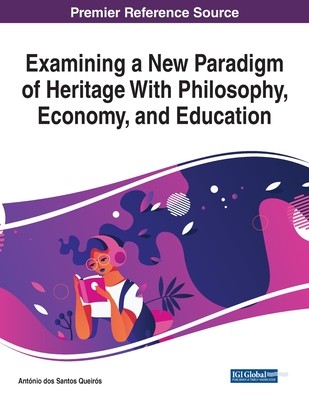
- We will send in 10–14 business days.
- Publisher: IGI Global
- ISBN-10: 1799836371
- ISBN-13: 9781799836377
- Format: 21.6 x 27.9 x 1.7 cm, softcover
- Language: English
- SAVE -10% with code: EXTRA
Examining a New Paradigm of Heritage With Philosophy, Economy, and Education (e-book) (used book) | bookbook.eu
Reviews
Description
OECD, UNESCO, the European Union, and the United Nations acknowledge that formal educational systems alone cannot respond to rapid and constant technological, social, and economic change in society and that they should be reinforced by non-formal educational practices. Examining a New Paradigm of Heritage With Philosophy, Economy, and Education is a critical scholarly publication that provides comprehensive research on the sustainability of identity and cultural heritage. The book establishes uniform and consistent conceptual criteria to identify and distinguish the different typological categories of heritage and discusses the concept of "cultural landscape" and environmental ethics. Moreover, connections between cultural heritage and natural heritage and the economy of heritage are explored. Finally, the book discusses cultural landscape as an educational resource with reading and interpretation of the cultural landscape as a basis for learning with a methodology of experimental science and its first metamorphosis of value. Featuring a range of topics such as curriculum design, ethics, and environmental tourism, this book is ideal for academicians, sociologists, biologists, researchers, policymakers, and students.
EXTRA 10 % discount with code: EXTRA
The promotion ends in 20d.22:12:50
The discount code is valid when purchasing from 10 €. Discounts do not stack.
- Publisher: IGI Global
- ISBN-10: 1799836371
- ISBN-13: 9781799836377
- Format: 21.6 x 27.9 x 1.7 cm, softcover
- Language: English English
OECD, UNESCO, the European Union, and the United Nations acknowledge that formal educational systems alone cannot respond to rapid and constant technological, social, and economic change in society and that they should be reinforced by non-formal educational practices. Examining a New Paradigm of Heritage With Philosophy, Economy, and Education is a critical scholarly publication that provides comprehensive research on the sustainability of identity and cultural heritage. The book establishes uniform and consistent conceptual criteria to identify and distinguish the different typological categories of heritage and discusses the concept of "cultural landscape" and environmental ethics. Moreover, connections between cultural heritage and natural heritage and the economy of heritage are explored. Finally, the book discusses cultural landscape as an educational resource with reading and interpretation of the cultural landscape as a basis for learning with a methodology of experimental science and its first metamorphosis of value. Featuring a range of topics such as curriculum design, ethics, and environmental tourism, this book is ideal for academicians, sociologists, biologists, researchers, policymakers, and students.


Reviews